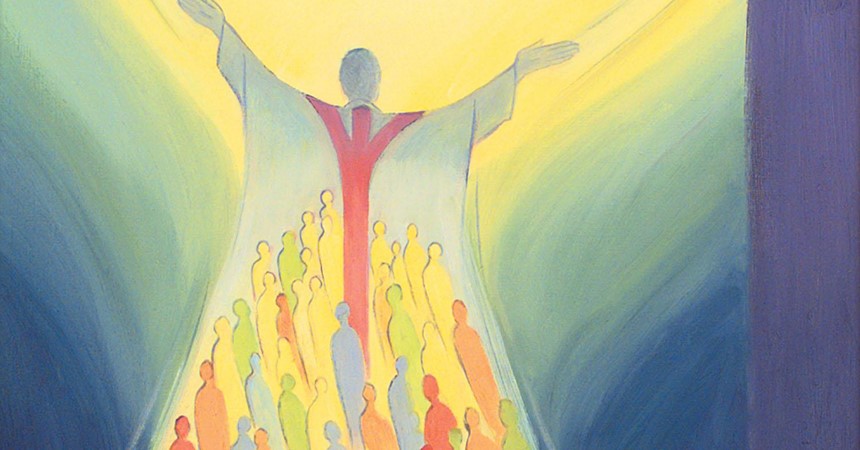Then we considered the essential nature of the ‘Liturgy of the Word’. Today we turn to the ‘Liturgy of the Eucharist’ in which we respond to the Word by doing what Jesus commanded us to do in his memory.
What better start could we have than Sunday’s celebration of the Body and Blood of Christ. What struck you in the readings from Sunday? I was grabbed by the images of wilderness and hunger in the first reading from Deuteronomy. For me they resonate with our experience of isolation from the public celebration of Mass. With the exception of our brothers who are ordained priests, all of us have been hungering for both the body and blood of Christ on the altar, and the body of Christ gathered around the altar. The experience of wilderness (isolation) and hunger changes you. The same reading talks about being humbled and tested to reveal our inmost heart.
All of us bring our experience of the Word of God to the ‘Liturgy of the Eucharist’. All of us bring our experience of isolation and hunger to this reflection. This experience has changed us. Change opens our eyes and hearts to see and know things differently. So, let us proceed to look differently at what, until recent times, has been so familiar.
We will focus on the liturgical texts to help us reflect on what we are doing together when we celebrate eucharist. We will also reflect on some scripture. Each time you are invited to engage with our three mystagogical questions:
- What did you notice?
- What does it reveal to you/us (about God, Christ, the church, the liturgy …)?
- What does it ask of you/us?
Firstly, you are invited to look up and pray with the following scripture texts:
‘The feeding of the Five Thousand’ in Matthew 14:13-21 and 15: 32-39.
‘The Last Supper’ in Matthew 26: 26-29
Notice the verbs used to describe Jesus’ action.
The General Instruction of the Roman Missal (GIRM) explains how our celebration of eucharist embodies the same ‘take – bless – break – give’ eucharistic action recorded in the scripture. It says …
- At the Last Supper Christ instituted the Paschal Sacrifice and banquet, by which the Sacrifice of the Cross is continuously made present in the Church whenever the Priest, representing Christ the Lord, carries out what the Lord himself did and handed over to his disciples to be done in his memory.69
For Christ took the bread and the chalice, gave thanks, broke the bread and gave it to his disciples, saying: Take, eat and drink: this is my Body; this is the chalice of my Blood. Do this in memory of me. Hence, the Church has arranged the entire celebration of the Liturgy of the Eucharist in parts corresponding to precisely these words and actions of Christ, namely:
-
- a) At the Preparation of the Gifts, bread and wine with water are brought to the altar, the same elements, that is to say, which Christ took into his hands.
- b) In the Eucharistic Prayer, thanks is given to God for the whole work of salvation, and the offerings become the Body and Blood of Christ.
- c) Through the fraction and through Communion, the faithful, though many, receive from the one bread the Lord’s Body and from the one chalice the Lord’s Blood in the same way that the Apostles received them from the hands of Christ himself.
The celebration of eucharist is not a moment. It is a four-part action in which each part is essential. Any one part loses its meaning and purpose when isolated from the other parts. There can only be a communion procession because there has firstly been a procession of the people to present their gifts to God to ‘taken, blessed, broken and given’ through, with and in Christ and the unity of the Holy Spirit.
The celebration of eucharist is an action that we do together. This is clear in the GIRM a. 95, echoing the Constitution on the Sacred Liturgy a. 48.
- In the celebration of Mass the faithful form a holy people, a people of God’s own possession and a royal priesthood, so that they may give thanks to God and offer the unblemished sacrificial Victim not only by means of the hands of the Priest but also together with him and so that they may learn to offer their very selves.83 They should, moreover, take care to show this by their deep religious sense and their charity toward brothers and sisters who participate with them in the same celebration.
They are consequently to avoid any appearance of singularity or division, keeping in mind that they have only one Father in heaven and that hence are all brothers or sisters one to the other.
- Moreover, they are to form one body, whether in hearing the Word of God, or in taking part in the prayers and in the singing, or above all by the common offering of the Sacrifice and by participating together at the Lord’s table. This unity is beautifully apparent from the gestures and bodily postures observed together by the faithful.
- The faithful, moreover, should not refuse to serve the People of God in gladness whenever they are asked to perform some particular service or function in the celebration.
As ‘celebrants’ our full, conscious and active participation in the ‘Liturgy of the Eucharist’ is attentive to the entire four-part action. As ‘consumers’ we are focused on single moments such as the ‘consecration’ or my reception of communion. As ‘celebrants’ we are conscious that we are acting together as a community. As ‘consumers’ our focus is ‘me and God.’ As ‘celebrants’ presiders respect the ‘Liturgy of the Eucharist’ as an action of the whole church – ‘my sacrifice and yours’ – and refrain from adding actions that reflect a personal spirituality and harken back to a previous age, relegating the lay faithful to the status of ‘consumers’.
Are we celebrants or consumers? The answer matters. As we begin to gather again for the public celebration of the liturgy, to what change is the Holy Spirit calling you? To what change is the Holy Spirit calling us? We are different. Hopefully our isolation from eucharist is testing our inmost heart and carving out in us a deeper mode of participation in the ‘Liturgy of the Eucharist’.
Imagine what the Church community would be like if we were all celebrants! Our world and our society need us to be celebrants.
In the next Liturgy Matters we will focus on the first of this four-part action – the Presentation of Gifts.
You might like to read this article from America Magazine, ‘Social Distancing and the Sacraments: How the Coronavirus has changed our sense of communion’. You should be able to open this as this magazine allows people to view five free articles a month.
You might like to watch an interview Michael Kelly sj facilitated on virtual Mass.
Acknowledgements
GIRM references are from the English Translation of the Roman Missal © 2010 International Committee on English in the Liturgy Inc. (ICEL). All rights reserved.
Image: Illustration by Elizabeth Wang. T-00535-OL-V2. © Radiant Light 2006, www.radiantlight.org.uk. Used with permission.

